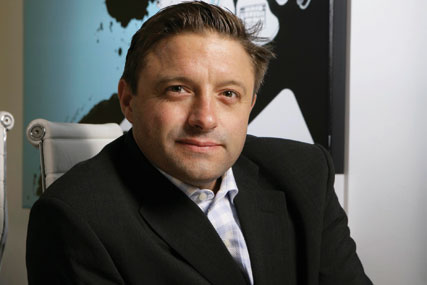"If Google's about organising the world's content, Blyk's about liberalising free communication."
It's a bold comparison, measuring nascent mobile advertising company Blyk against the mighty Google, but Shaun Gregory, Blyk's new chief executive, is not afraid to draw such links.
The ex-boss of new media at the Telegraph Media Group took up his new position last Thursday (1 November) and is already talking up Blyk's ambitions to provide two-thirds of the UK's 16 to 24-year-olds with free mobile voice and SMS services.
"That would mean 4.5 million people wouldn't get a phone bill. It's really interesting, isn't it - that communication should be for free?" he reflects.
Drawing again on the Google analogy, he sums up the business' proposition as "search in reverse": members of the Blyk network are recruited by invitation and required to fill in all manner of personal information about their profile and lifestyle, which then sees them receive six highly targeted ads a day in return for 217 free SMS and 43 free minutes' talk time per month.
"For me, relevance is one of the key things. It's far more intelligent than just getting free advertising," claims Gregory.
Specific interests
The model is built on several months' research since Blyk's launch in Finland 18 months ago, which found 71% of young people "would like to receive advertising targeted to their specific interests".
The demographic is key - it's a notoriously hard-to-reach group, but a crucial age for building brand loyalty. Brands already signed up include Adidas, L'Oreal, Colgate, Sky, Sony Ericsson, Coca-Cola and McDonald's - heavyweight advertisers that suggest Blyk could be onto something very big.
"If you have a clear profile of everyone, that's pretty big in itself, and it's all opt-in - that for me is the future of the market," says Gregory. "The whole proposition is very well thought through. It's not some jiggery-pokery new offering - they're going to shape the future of advertising per se, not just mobile advertising."
While he doesn't yet have an official job description, Gregory says his remit will be to build and lead the team to "shape the future of communication and mobile advertising in particular".
"It's about making sure we deliver the members and advertiser base and there's the potential - if and when we launch in other markets - to take advertising deals out of London," he adds.
Although the bosses remain cautious about revealing too much of their plans for expansion outside the UK, it is clear they have their eye on Europe and even further afield - chief operating officer Leif Fagelstedt has been having discussions in Asia, for example.
And Gregory's role will be fundamental. Fagelstedt explains: "Shaun will follow trends and develop offerings with leading agencies and implement that in other markets."
For now, though, the UK remains the "centre of gravity", where there is the most competition, the most brands and the most spend in the target audience. Indeed, it was Gregory's knowledge of the home market that made him the right man for the job.
"All of us have very different backgrounds," explains Fagelstedt, himself ex-IBM and Nokia. "What Shaun represents is a tremendously high understanding of the media industry business and a passion for developing something new."
Cutting edge
It was this passion for being at the cutting edge that prompted Gregory to leave The Telegraph after just 14 months, though he insists it was a great job where he "would have stayed 14 years".
"It was a difficult decision, but ultimately an opportunity like Blyk doesn't come along often," he says.
"One of the things that impressed me about the team is that it's very focused on user experience. A lot of people have not understood the value of consumer experience or the importance of relevancy and not really tried to deliver it in an intelligent way. Blyk is a mixture of all things - consumer experience is at the heart of this."
Mobile is certainly shaping up as the next landgrab opportunity for media, if not - as Gregory claims - the future of advertising, and Blyk is positioning itself to be at the forefront when the industry reaches that long-awaited tipping point.
And it may finally be close, Gregory suggests: "If you think back to the early days of online, there was a real knowledge gap. That's going to exist for some time in mobile, but what's starting to happen is there will be examples of other people in the market unlocking the potential of mobile.
"It has more potential than WAP or banners, so why not make it more interesting? That's what Blyk's trying to do."
CV
2007: Chief executive, Blyk
2006: Director of new media, Telegraph Media Group
2004: Managing director, Emap National Brands
2000: Strategy and development director, Emap Performance
1997: Managing director, Emap Digital, Hallam and Magic
1994: Sales director, Emap Radio City, Aire and Hallam
1991: Group sales head, Metro Group
1988: Sales executive, United Provincial Newspapers.


